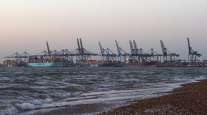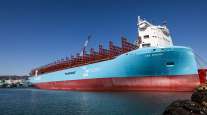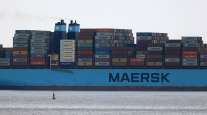World’s Biggest Container Liner Looks for Deals Outside Shipping

The world’s largest container company will start looking for takeover targets outside the shipping industry as it tries to pre-empt a new competitive landscape in which customers are morphing into rivals.
Jakob Stausholm, A. P. Moller-Maersk A/S’s chief financial officer and head of transformation and strategy, says the company needs to expand its land-based activities to meet a growing need from clients.
“We’re currently very big in the ocean segment, and we’d rather grow in non-ocean, so it may be a good idea to look for M&A targets there,” Stausholm said in an interview Feb. 20.
Buying land-based activities would mark a shift from the kind of consolidation Maersk and the industry have targeted in recent years. The Danish company, which is in the middle of offloading its energy business and last year completed its acquisition of Hamburg Sud, now has 20% of the container shipping market. Maersk says it wants to be part of further consolidation, but analysts warn it may face regulatory hurdles.
RELATED: Maersk's CEO can't imagine self-sailing box ships in his lifetime
RELATED: Amazon threat has Maersk racing to stop clients from becoming rivals
Now, Maersk is expanding its competitive universe to include different types of companies, including couriers like FedEx Corp. and UPS Inc., the CFO said.
“We’re not going to be direct competitors to FedEx and UPS, but we will see them as peers,” he said. “They are the global integrators in their industries and we want to become that in our industry.”
FedEx ranks No. 2 and UPS No. 1 on the Transport Topics Top 100 list of the largest North American for-hire carriers.
The CFO declined to identify what specific parts of the land-based logistics chain Maersk may target for takeovers. He also said it may take some time before Maersk makes such acquisitions because the Copenhagen-based company is still focusing on getting its transport units to work more closely together.
Starting this year, Maersk will report revenue based on its ocean and non-ocean operations, with the latter including the logistic service activities and the port terminals. In 2017, non-ocean revenue made up about 28 percent of Maersk’s sales.
“It’s clear that we are very small in that area,” Stausholm said. “We’ll see that non-ocean will grow.”




